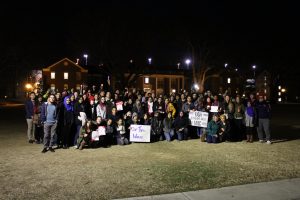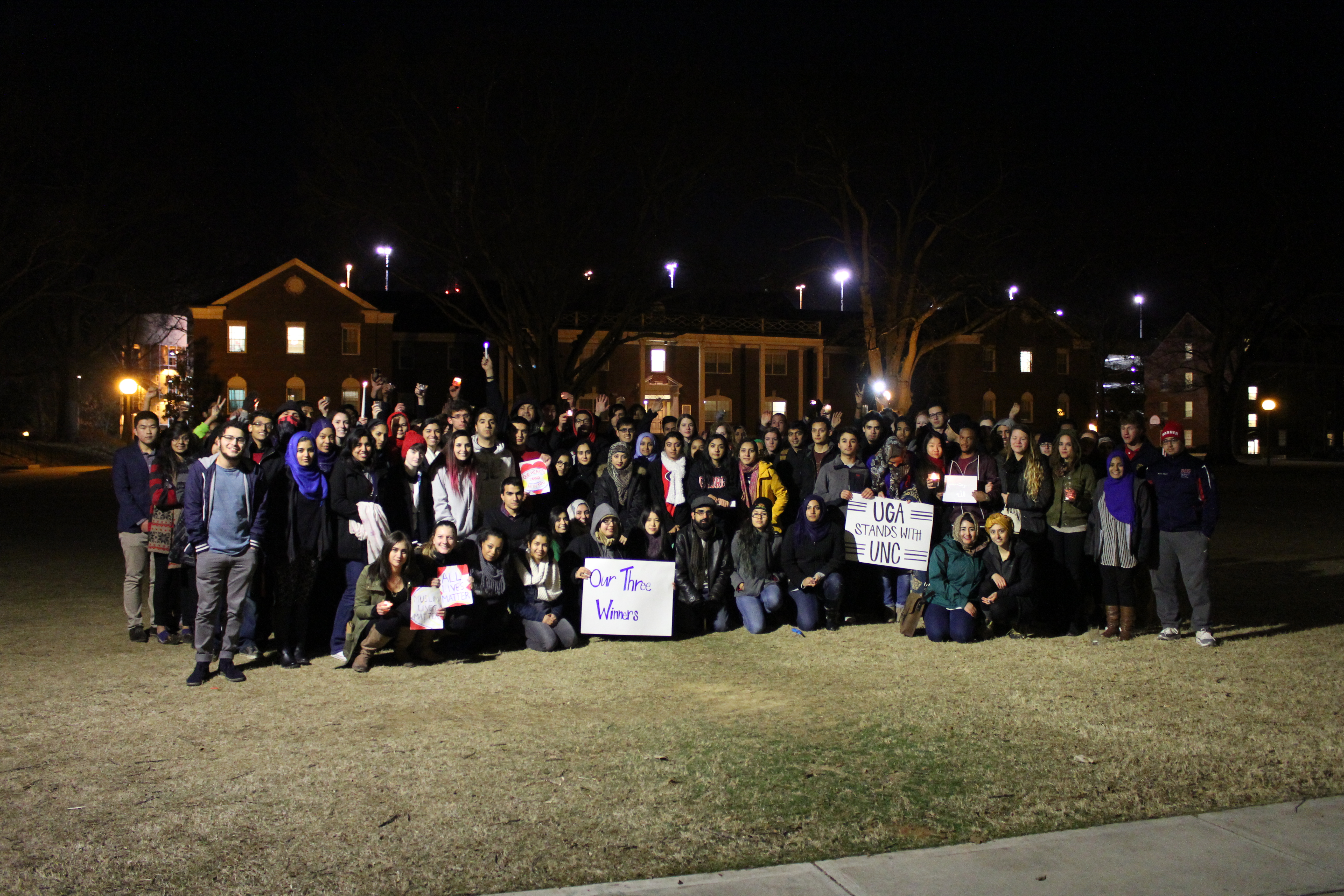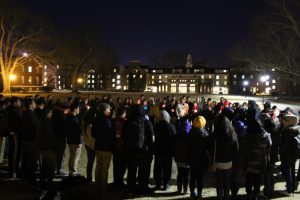
By Faiz Saulat
Three young Muslim students at the University of North Carolina at Chapel Hill were shot in the head on February 10, 2015 by Craig Stephen Hicks, a 46-year-old white male. While some claim the dispute was over a parking space, the local Muslim community as well as the Council of American Islamic Relations is pushing investigators to determine if any religious motives were involved.
Deah Shaddy Barakat, 23, was walking outside with his wife, Yusor Mohammad Abu-Salha, 21, and her sister, Razan Mohammad Abu-Salha, 19, when all three were slain at their apartment near UNC. Deah had been working to provide dental care to Syrian refugees in Turkey over the next summer and was working with his wife at the time to provide dental supplies to the homeless in the area. Yusor was about to enter dental school, and her younger sister Razan was an architecture and environmental design student at NC State. Despite these contributions and future ambitions, the lack of media coverage following the attacks indicates clear biases in how American Muslims are portrayed by the media.
The general trend among media headlines is to categorize white perpetrators as “insane” or mentally unstable. The court case surrounding James Holmes of the Aurora, Colorado shootings did not once mention any affiliation to terroristic motives. Rather, the controversy in court was based on whether Holmes could be considered mentally insane. Similarly, following the Sandy Hook shooting, an opinion piece from CNN news responded to the actions of Adam Lanza by writing “In the end, we may simply never know why Lanza did what he did other than that he was a disturbed, angry young man who made the choice to do something horrible.”
Yet such vague and secular explanations are rarely offered toward acts of crime by Muslims. For example, in the 2012 Trayvon Martin shooting, George Zimmerman stated in an interview that the incident was “God’s plan.” Furthermore, a look into his religious affiliations showed that he grew up as a Catholic altar boy. However, despite such religious connections, the majority of the controversy surrounding the shooting of Martin questioned self-defense motives as opposed to religious reasons. While some may argue that he did not act in the name Catholicism, there still exists a double standard in associating terrorism with religion only when alleged Muslims are involved.
In addition to the media’s biased use of the “terrorism” label, outlets treated the murder of the three UNC Muslim students as an insignificant incident. The tragedy did not receive much coverage in the first place, and the coverage it did receive was distorted. While mainstream media outlets such as MSNBC and Fox news covered the tragic deaths of the three UNC students, they failed to do so until 12 hours after the fact, the day after the incident.
https://twitter.com/JRehling/status/565404749852602368
American media has skillfully ignored violence against American Muslims while highlighting violent behavior conducted by them. As stated by Khaled Beydoun, assistant law professor at Barry University, the recent attack on the Charlie Hebdo publication “manifest[s] the baseline that Muslim identity is only newsworthy when the subject is standing behind the gun. Not in front of it.” This is particularly apparent considering that the media covered the death of the cartoonists far more extensively than the Muslim police officer who sacrificed his life to defend the individuals in the building who, ironically, were ridiculing his faith’s revered religious figure, the prophet Muhammad.
Even though American networks have focused on Muslims only when they have been “behind the gun,” media outlets such as Fox News still ask moderate American Muslims to speak out more against extremism. Such media outlets expect Muslims to be vocal when, paradoxically, Muslims are only heard when crimes are committed in the name of Islam. Despite community activism against terrorist groups across the world, they are still seen as not doing enough. Where is the eagerness for Muslim voices when innocent students were slain?
Muslims, especially those in the United States, are treated with a double standard. When their lives are taken, the murders remain unnoticed and overlooked. The few incidences where such violence is actually discussed, Muslims are seen as victims of nothing more than armed and insane individuals. Yet when a Muslim finger pulls the trigger, the incident explodes into a frenzy of religiously motivated terror. Nonetheless, the deaths of Deah, Yusor, and Razan shook those with a conscience across the nation. The loss of the innocent can be felt on our own campus as UGA students gathered around the Myers Quad for a ceremonial vigil in honor of those murdered. Unfortunately, despite the trending social media campaigns and the public outrage of students, the reactions of the media and, therefore, the unresponsiveness of the public, seemingly illustrates that loss of Muslim lives deserve less coverage that others in American media.




